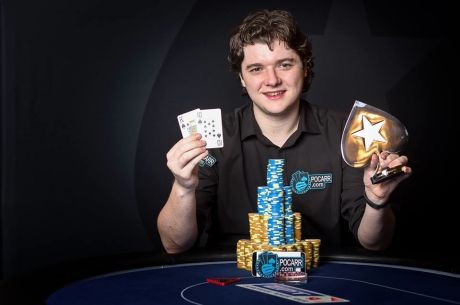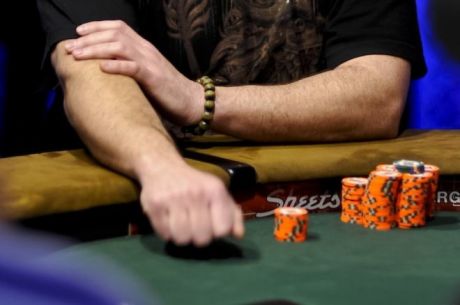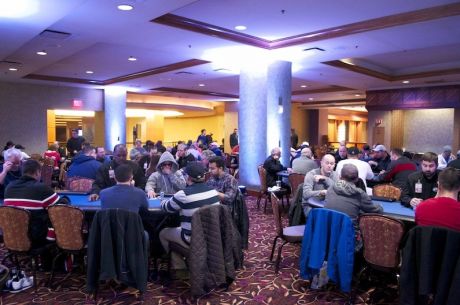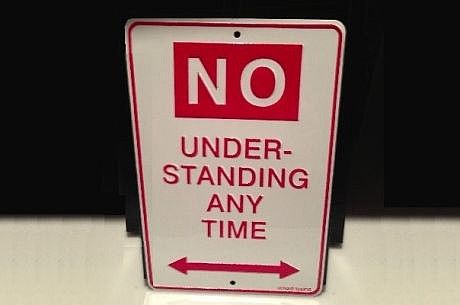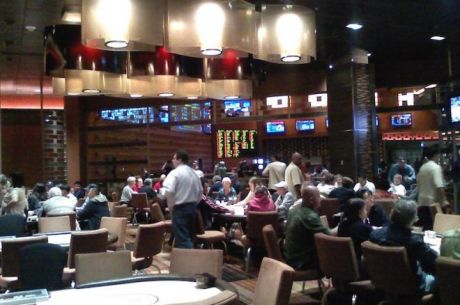Casino Poker for Beginners: You Can Say These Words at the Table, But Be Careful When You Do

In my last “Casino Poker for Beginners” installment, I told you about the one thing you can’t talk about at the poker table — the hand in progress. This time I want to tell you about words you can say, but which you have to be very careful about, lest they have consequences you didn’t intend.
In particular, you have to be really careful about any of the words used to declare your action such as “raise,” “call,” “bet,” “check,” “fold,” or “all in.” When it’s your turn and you want or need to indicate your desired action verbally rather than silently, of course it’s perfectly appropriate to use those words. But if they escape your lips when you’re not intending to take your turn, the result can be disastrous.
Let me illustrate with some real-life stories.
In a tournament at what was then the Las Vegas Hilton poker room, I witnessed the following occur. Before the flop, the player who was going to be second to act jumped the gun and started to push his whole stack in when it wasn’t yet his turn. He apparently realized his error and aborted the move before the chips crossed the betting line. The player whose turn it actually was noticed this, and asked him “You’re all in?” The dealer then announced “All in.”
The dealer had clearly heard those last two words from the player, but not what went before, nor the voice inflection of the question. The player protested that she wasn’t moving all in. The floor was called and ruled that the “all in” was binding, even if the player had not meant for it to be. She lost a big pot and was understandably unhappy about it.
This sort of thing happens a lot. The player with action pending is not quite sure what the previous player did or said, and so asks, with a little rising pitch to imply a question — “All in?” or “Check?” or “Call?”
But casinos are noisy environments, and the dealer and/or other players sometimes hear only the magic words, taking them for a declaration rather than a question. Sometimes the player will be allowed to clarify his meaning, but at least as often the words will be taken as binding. This can happen even if the question has other words in it, such as “Did you say ‘raise’?”
If you need to clarify what another player did before making your decision, you need to remember to phrase the question in a way that does not include any of the magic “action” words. Don’t ask the dealer “Did he check?” Instead ask “What was his action?” or “What did he do?”
A dealer friend told me about a situation in which a player was idly telling a poker story to the guy sitting next to him. Unfortunately, the storyteller recounted somebody having emphatically declared “All in.” Also unfortunately, it had become the storyteller’s turn — unbeknownst to him — just before he’d reached that part of the story. As you might guess, both the dealer and other players picked up the clear-as-a-bell “All in” without hearing the context. And yes, it was determined to be binding.
Several years ago at a World Poker Tour final table, Kido Pham attempted an unusual gambit against his opponent, Brian Kainer, who was all in. Pham told Kainer that he (Pham) would do whatever Kainer wanted him to do, either call or fold.
Pham said, “You call it — yes, no, whatever.” When Kainer didn’t reply, Pham gave him a countdown: “Three seconds. You call it.” Still getting no reaction, Pham counted down the time: “One... Two... Three... I call it.”
The dealer announced a call, and the announcer in the arena repeated that. But Pham quickly realized that he had been misunderstood. He didn’t mean that he intended to call the bet, only that his offer to let Kainer make the decision for him was rescinded, and he (Pham) would make the decision for himself.
The tournament director was called in to make a ruling, and he decided — correctly, in my view — that Pham’s words “I call it” were binding, regardless of whether he intended something other than calling the bet.
While they were awaiting the decision, commentator Mike Sexton observed to his co-host, Vince Van Patten, “Vince, he would have nobody to blame but himself if they make him put his money in and he loses this pot” — which is exactly what happened.
You might think that that’s a freaky, one-off situation, but I once saw a very similar occurrence. An early-position player raised, and when the action got around to the player on the button, he addressed the raiser by saying “I know you’re raising with nothing. You have something like 8-2 of diamonds — I’m calling it right now.” Then he threw his cards in the muck.
It took me a couple of seconds to realize what had happened, but in retrospect what he apparently meant by “I’m calling it” was not that he was calling the raise, but that he was predicting what the raiser’s cards were.
That player got lucky. The ruling was to let his intention — which was not to call — determine the interpretation of his words. But it could (and probably should) have gone the other way, with the button committed to a call with what was now a dead hand, his cards having been mucked.
When it’s your turn to act, those “action” words have the power to determine the fate of your chips. Don’t use them unless you really mean to.
Robert Woolley lives in Asheville, NC. He spent several years in Las Vegas and chronicled his life in poker on the “” blog.
Want to stay atop all the latest in the poker world? If so, make sure to get PokerNews updates on your social media outlets. on Twitter and find us on both and !


